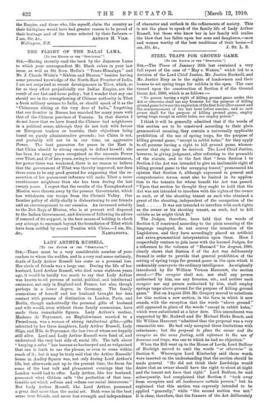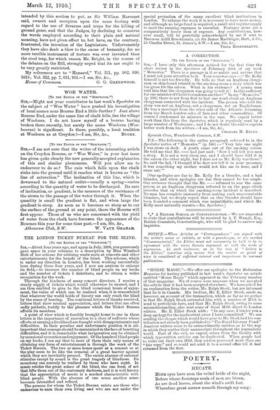STEEL TRAPS FOR GROUND GAME. [To THE EDITOR Or THE
"SPECTATOR."]
Srn,—The Times of January 20th last contained a very full report of the case of " May v. Waters," which led to a decision of the Lord Chief Justice, Mr. Justice Bucknill, and Mr. Justice Bray as to the rights of landowners and their lessees to set spring traps for rabbits in the open. The case turned upon the construction of Section 6 of the Ground Game Act, 1880, which is as follows :-
" No person having a right of killing ground game under this Act or otherwise shall use any firearms for the purpose of killing ground game between the expiration of the first hour after sunset and the commencement of the last hour before sunrise; and no such person shall for the purpose of killing ground game, employ spring traps except in rabbit holes, nor employ poison."
I think it will be generally admitted that if the words of this section are to be construed according to their plain
grammatical meaning, they contain a universally applicable prohibition of the use of spring traps, for the purpose of killing ground game, " except in rabbit holes," for they apply to all persons having a right to kill ground game, whence- soever that right may be derived. The Lord Chief Justice, however, in giving judgment, after referring to the preamble of the statute, and to the fact that " from Section 1 to Section 5 the Act was intended to give an inalienable right of killing ground game to the occupying tenant," pronounced his opinion that Section 6, although expressed in general and comprehensive terms, must also be limited in its applica- tion to the tenants for whose benefit the Act was passed.
" Upon that section be thought they ought to hold that the Act was not intended to interfere with the rights of the owner as such, or of the shooting tenant as such who obtained a grant of the shooting, independent of the occupation of the land It was not intended to interfere with such rights as the owner or his shooting tenant, as such, had to kill rabbits as he might think fit."
The Judges, therefore, have held that the words of Section 6, if construed according to the plain meaning of the language employed, do not convey the intention of the Legislature, and they have accordingly placed an artificial and extra-grammatical interpretation upon them. Here I respectfully venture to join issue with the learned Judges, for a reference to the volumes of " Hansard " for August, 1880, clearly shows that Section 6 of the Act was deliberately framed in order to provide that general prohibition of the setting of spring traps for ground game in the open which it undeniably conveys to the ordinary intelligence. As originally introduced by Sir William Vernon Harcourt, the section stood:—" The occupier shall not, nor shall any person authorised by him, use any firearms, etc., and neither such
occupier nor any person authorised by him, shall employ springs traps above ground for the purpose of killing ground
game." But on August 25th Mr. Gregory moved to substitute for this section a new section, in the form in which it now stands, with the exception that the words "above ground" still appeared in place of the words " except in rabbit holes," which were substituted at a later date. This amendment was supported by Mr. Rodwell and Sir Michael Hicks Beach, and Sir William Harcourt " admitted that the proposal was a very reasonable one. He had only accepted these limitations with reluctance ; but the proposal to place the owner and the occupier on the same footing, with reference to the use of firearms and traps, was one to which he had no objection."
When the Bill went up to the House of Lords, Lord Balfour of Burleigh moved to omit the words " or otherwise" in Section 6. Whereupon Lord Kimberley said those words were inserted on the understanding that the section should be made general. "He did not think their Lordships would desire that an owner should have the right to shoot at night and the tenant not have that right." Lord Balfour, he said subsequently, had complained that Section 6 " took away from occupiers and all landowners certain powers," but he explained that this section was expressly intended to be applied "generally," while "the second section was not." It is clear, therefore, that the framers of the Act deliberately intended by this section to put, as Sir William Harcourt said, owners and occupiers upon the same footing with regard to the use of firearms and traps for the killing of ground game, and that the Judges, by declining to construe the words employed according to their plain and natural meaning, have not given effect to, but have, on the contrary, frustrated, the intention of the Legislature. Unfortunately they have also dealt a blow to the cause of humanity, for no more terrible instrument of torture was ever invented than the steel trap, for which reason Mr. Bright, in the course of the debates on the Bill, strongly urged that its use ought to be very greatly restricted.
My references are to " Hansard," Vol. 321, pp. 902, 930, 1615 ; Vol. 322, pp. 7, 811, 951.—I am, Sir, &c.,















































 Previous page
Previous page